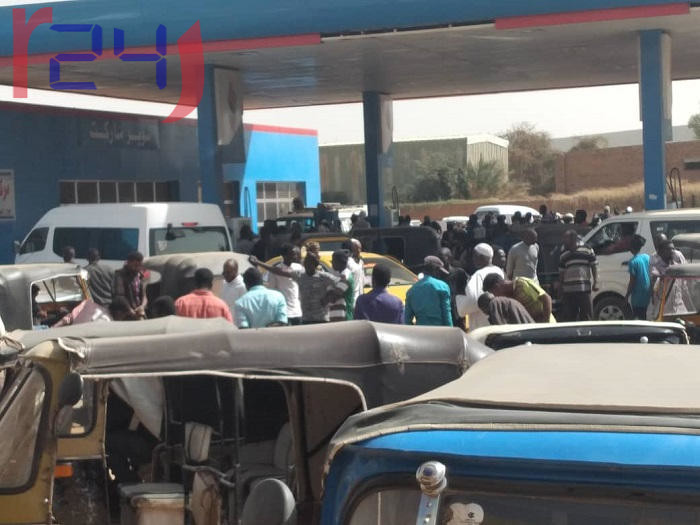February 14, 2020 (Khartoum) Oil crisis in Sudan has exacerbated in an unprecedented manner, as cars have been lining up in long lines in front of petrol stations in the capital, Khartoum, amid government promises to solve the crisis within hours,
Al-Amin Ibrahim, a truck driver ,told Darfur 24 that he had managed to refuel his vehicle after 6 hours of queuing in front of a petrol station in the capital Khartoum.
According to the workers association in the oil sector, the cause of the failure is the pumping of quantities of oil that do not meet the operational specifications through the pipeline, which led to a partial blockage in the line and required chemical treatments and the addition of temporary pumps in order to clean the line from the deposited wax materials.
Domestic production of oil covers 70% of the country’s benzene consumption, and about “53%” of gasoline, while the government resorts to import the rest of it from abroad.
The Association of workers in the oil sector, confirmed that the Jelly refinery began operating at its usual capacity on Tuesday to cover 80% of the country’s need for natural gas, 70% of benzine and 50% of gasoline, in addition to the derivatives available in Port Sudan.
Lifting subsidies
The experts considered the solutions announced by the Minister of Energy and Mining, Adel Ali Ibrahim, to end the crisis as merely “analgesics and emergency solutions” and the government and its political incubator “the forces for freedom and change should take the decision to lift subsidies on fuel.
On Monday, the Minister of Energy and Mining had set a specific share for the distribution of 16 liters at a value of 120 pounds for vehicles distributed every two days for the vehicle, while working to identify some stations for sale at a commercial price not yet determined.
The minister’s plan specified Saturday, Monday, and Wednesday for private cars whose plates start with even numbers, while the days of Sunday, Tuesday, and Thursday for the owners of individual plates, with Friday being for the general vehicles, with the exception of public transport vehicles from these procedures.
Monitoring
Economist and vice chancellor of the Red Sea University, Professor Hassan Bashir, told Darfur 24that the problem is that there are no fuel reserves in Sudan to meet any shortage in the event of an emergency to be compensated by the reserves, and that the lack of foreign exchange exacerbated the crisis.
the University professor advised government to take drastic remedies by providing large reserves of fuel and creating adequate storage containers, with strict control of the oil companies.
He pointed out that Sudan suffers from the ports problem, because its absorptive capacity cannot accommodate a number of ships at one time.
All these factors , represent problems in the infrastructure that was destroyed by the regime of the ousted president, Omar al-Bashir, and the sabotage of the systematic salvation regime of the economy, resources, and infrastructure continued over thirty years, and therefore, such crises do occur, in addition to the counter-revolution that works with all its energy and potential, and it possesses capabilities Great, untouched so far, and is now working with all its capabilities to create, nurture and deepen crises ” added the professor.
Smuggling
For his part, Professor of Political Science at Bahri University, Mohamed Ahmed Shaqila, told Darfur 24 that the solutions presented by Minister Adel Ali Ibrahim, with regrad to the fuel crisis, as it is temporary remedy and does not represent a fundamental solution to this crisis.
The fundamental solution clearly is to completely remove subsidies from gasoline, provided that diesel and cooking gas subsidies are preserved, for justified reasons, including that gasoline is smuggled to neighboring countries, and that those who own cars do not exceed” 2% “of the people, it is possible that Diesel fuel is subsidized as there are factories, freight transport, and deportation, and therefore it is used for the general Sudanese people.
The deep state
However, the leader of the Forces for Freedom and Change, Noureddine Salah, told Darfur 24 that the lifting of subsidy will be a radical solution, adding, “It is assumed that the lifting will take place in parallel with decisions like these.
He explained that the state is currently bearing beyond its capacity due to supporting strategic commodities such as bread, petroleum products and medicines, and that the decisions of the Minister of Energy on the crisis are merely analgesics and emergency solutions.
He continued, “The government and the forces of freedom and change need courage even to address the people with the reality of the economic situation, because temporary solutions will not lead the country forward, and return us to the policies of the former regime.”
Nour stressed that the deep state is working outside the official institution to implement its hidden agendas, especially after the recent decisions to dissolve and dismantle the National Congress Party, which makes it resort to fabricating crises, especially economic ones.
Nour pledged the possibility of getting rid of the deep state by institutional reform and transparency and abandoning previous methodologies, adding, “It is assumed that there are operational and strategic plans to get rid of the former regime affiliates.”

